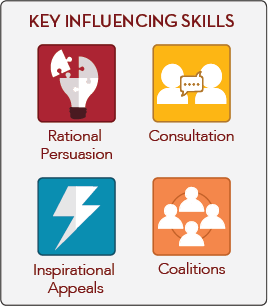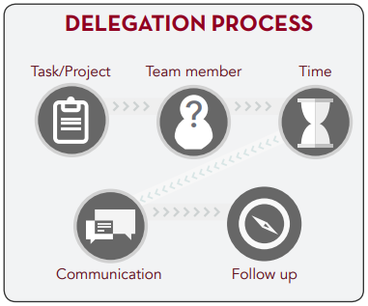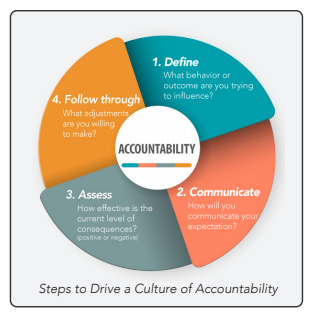Though core to supervision, driving results through your team can be daunting. Do you find yourself having trouble discerning between what is critical work and what is urgent? Are you looking for concrete steps on making a plan for your team? Need tools to keep your employees on track and accountable for the work being done? This module will help you pause, examine, and tweak your approach to driving results through your team.
Driving results through others involves orienting yourself to the critical results you want your team to achieve, planning for achieving those results, and managing the execution of your plan through your team. When done right, you will increase your team's impact, free yourself up for higher-level and more strategic work, and develop your employees' skills, knowledge and abilities.
Driving Results through Others Module
Taking the time to pause and orient yourself to results is an opportunity for you to clarify the purpose of your team and how you contribute to the University. Understanding your team's purpose and anything that may be getting in your way will set you up for planning how to achieve impactful results.
Review Quick Guide
The Quick Guide to Orienting to Results outlines the steps you need to take in order to clarify your team's purpose and let that drive the work you do.
- Define your team's purpose
- Turn purpose into challenging goals
- Challenge the status quo
- Set high standards and foster urgency around priorities
Orienting to Results Quick Guide
Apply What You've Learned
Orienting to results is the first step you need to take in order to drive results through others. Clarifying and understanding the purpose and most impactful work of the team you supervise is a critical step for planning to achieve those results.
Download the Orienting to Results Worksheet (MS Word) worksheet to walk through the steps of orienting to results.
Planning for results includes identifying the relevant steps, actions, and considerations to take to make sure the results are high quality and meaningful. A well thought through plan will provide you, your team, and key stakeholders more clarity and will give you an opportunity to revise the workflow to drive higher-impact results.
Review Quick Guide
The Quick Guide to Planning for Results outlines the four steps you need to take to create a plan that drives high-impact results.
- Identify action steps, key stakeholders, and resources
- Establish realistic timelines
- Identify risks and plan contingencies
- Communicate expectations to everyone
Planning for Results Quick Guide
Learn About Influencing Others

Bringing people along to support your idea is no easy task. It’s easy for a project to get stalled because a key stakeholder did not support and champion it. Even the best processes can fail to deliver results if people can impact decisions that drive your results. The Quick Guide to Influencing describes three steps that can help you influence more effectively.
- Establish the goal
- Assess your audience
- Determine the key influencing skills and tactics to use
Learn About Delegating

Supervisors need to delegate to build capacity and achieve results. Delegation provides you with an opportunity to develop your employees while freeing up your capacity to deal with higher-level tasks. The Quick Guide to Delegation outlines five steps for effective delegation to help improve overall results.
- Identify the task/project
- Identify the team members
- Determine whether this is a good time to delegate
- Provide clear communication
- Follow up
Apply What You've Learned
This scenario will help you know how to decide who to influence, who and what to delegate, and what to do about risks.
Managing execution is the application of your plan through conversations, feedback, coaching, and accountability. This is how you achieve the high-impact results you have identified and planned for.
Learn About Metrics
As a supervisor, it's important to establish metrics or performance indicators in order to track the overall progress. Establishing metrics and indicators will allow you to know when you need to:
- Step in and provide more guidance and direction
- Celebrate and recognize outstanding progress
- Adjust the deadlines or project’s scope
Depending on the nature of your work, metrics may be quantitative (deadlines, milestones, key performance indicators, etc.) or qualitative (improved quality of work, behavior changes, etc.). Either way, you will need to establish a specific outcome or observable behavior to monitor. This behavior or outcome can also be defined as a “key accountability.”
Review Quick Guide
Accountability is one of the most effective tools a supervisor has for making sure important work gets done. A strong culture of accountability lets you:
- Achieve critical results in your team
- Engage and motivate employees
- Address poor performance

Accountability means that there is a consequence (positive or negative) if a person takes or does not take an action. It is also an iterative process where you go through the four main steps to achieve results:
- Define. What behavior or outcome are you trying to influence? How can you connect it with the overall metrics you defined?
- Communicate. How will you communicate your expectations?
- Assess. How effective is the current level of consequences (positive or negative)?
- Follow through. What adjustments are you willing to make?
Review the Quick Guide to Establishing a Culture of Accountability for more on the accountability ladder and best practices.
Establishing a Culture of Accountability Quick Guide
Apply What You've Learned
Work through an interactive self-check quiz below to apply what you've learned about managing execution and accountability.
You have completed this module
Congratulations! You have completed this online module. The following are module materials and related resources. We encourage you to explore other online modules to continue your supervisory development journey.
Core Reading
- David J. Snowden and Mary E. Boone. (2015, December 07). A Leader's Framework for Decision Making.
- HBR guide to project management. (2013). Boston: Harvard Business Review Press.
- Jack B. Soll, Mankins, M., John Beshears, S., & Daniel Kahneman, D. (2015, November 16). Outsmart Your Own Biases.
- Nick Craig and Scott A. Snook. (2014, August 18). From Purpose to Impact.
- Parent, M. M., & Deephouse, D. L. (2007). A Case Study of Stakeholder Identification and Prioritization by Managers. Journal of Business Ethics, 75(1), 1-23. doi:10.1007/s10551-007-9533-y
- Zhu, M., Yang, Y., & Hsee, C. K. (2018). The Mere Urgency Effect. Journal of Consumer Research. doi:10.1093/jcr/ucy008